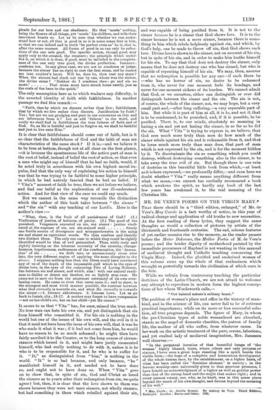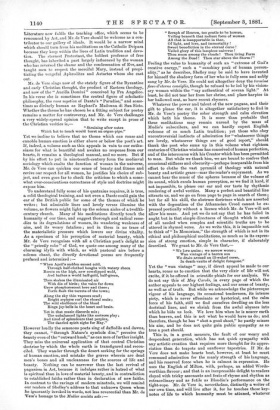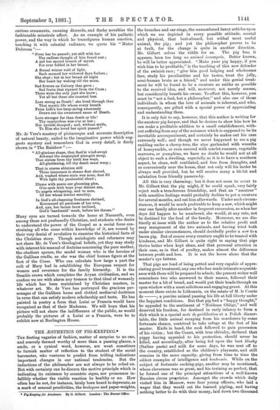MR. DE VERE'S POEMS ON THE VIRGIN MARY.*
THAT there should be a "third edition, enlarged," of Mr. de Vere's May Carols is a fact worthy of notice, in this year of radical change and application of old truths to new necessities. At the first reading of these lyrics, they suggest the same thoughts as would a collection of pictures by artists of the thirteenth and fourteenth centuries. The sad, solemn features of yet earlier mosaics rise to the memory, as the reader pauses before the Mater Dolorosa, the Mulier Fortis of M. de Vase's poems ; and the tender dignity of motherhood painted by the immediate precursors of Raphael is not wanting in this manual of medisaval thought and Catholic teaching concerning the Virgin Mary. Indeed, the glorified and enshrined woman of this volume sums up the whole of that enthusiasm which wrought so powerfully towards the civilisation of which ours is
the heir.
While we refrain from controversy touching the particular doctrines of the Latin Church, we are not afraid to welcome any attempt to reproduce in modern form the highest concep- tions of her whom Wordsworth calls,— " Our tainted nature's solitary boast."
The problem of woman's place and office in the history of man- kind, and in the science of life, can never fail to be of extreme practical importance; while on its more or less successful solu- tion, all true progress depends. The figure of Mary, in whom the pre-Christian types of noble womanhood are absorbed, stands as the angel of domestic charities, the patron of family life, the mother of all who suffer, from whatever cause. In her work on the artistic treatment of the pure, serene, laborious, and yet exalted lady of mediaaval imagination, Mrs. Jameson well observes :—
"In the perpetual iteration of that beautiful image of the woman' highly blessed, there, where others saw only pictures or statues, I have seen a great hope standing like a spirit beside the visible form,—the hope of a complete and harmonious development of the whole human race, by the establishment, on a higher basis, of what has been called the feminine element' in society ; in the fervent worship once universally given to that gracious presence, I have beheld an acknowledgment of a higher as well as gentler power than that of the strong hand and the might that makes right ; and in every earnest votary, one, who, as he knelt, was in this sense pious beyond the reach of his own.thought, and devout beyond the meaning of his will."
• .Meg Carols ; or, dacilla Domini. By Aubrey de Vere. Third Edition, Enlarged. London: Burns-and Oates. 1881.
Literature now fulfils the teaching office, which seems to be renounced by Art, and. Mr. de Vere should be welcome as a con- tributor to our gallery of ideals. It would be a narrow mind which should turn from his meditations on the Catholic Deipara because they keep within the lines of Latin tradition and devo- tion. The sternest Protestant, the boldest professor of free thought, has inherited a past largely influenced by the woman who has reversed the shame and the condemnation of Eve, and taught men to respect the merciful Mary, instead of propi- tiating the vengeful Aphrodites and. Astartes whom she cast out.
Mr. de Vere sings now of the stately figure of the Byzantine and early Christian thought, the product of Eastern theology, and now of the " Ancilla Domini " conceived by Fra Angelico.
In his verse she is sometimes the central figure of scholastic philosophy, the rosa mystica of Dante's "Paradise," and some-
times as divinely human as Raphael's Madonna di San Sisto.
Whether the theme he has chosen be a fitting subject for poetry remains a matter for controversy, and Mr. de Vere challenges a very widely-spread opinion that to write except in prose of the Christian verities is,—
"Straining after notes Which but to touch would burst an organ-pipe."
Yet we incline to believe that no theme which can rouse and -ennoble human emotion is either above or below the poet's art.
If, indeed, a volume such as this appeals in vain to our enthu- siasm for what is beautiful and awakes no response from our hearts, it remains a theological manual, and no more. But if by his effort to put in nineteenth-century form the mediaeval sociology which exalts the function of woman in the universe, Mr. de Vere can quicken our sense of beauty and fitness and revive our respect for all women, he justifies his choice of sub- ject, and even goes far to check the criticism to which a some- what over-conscientious correctness of style and doctrine might expose him.
To understand fully some of his quatrains requires, it is true, a solid theological training, and not even a Dante could gain the ear of the British public for some of the themes of which he writes ; but admirable lines and lovely verses illumine the volume, as flowers might light up the solemn aisles of a twelfth- century church. Many of his meditations directly touch the humanity of our time, and suggest thorough and radical reme- dies to its degradations of women, its wandering weakness of aim, and its weary fatalism ; and in them is no trace of the materialistic pressure which lowers our divine vitality. As a specimen of his perception of material beauty, which
Mr. de Vere recognises with all a Christian poet's delight as -the "priestly robe" of God, we quote one among many of the
• charming idylls with which, as with pastoral airs before a solemn chant, the directly devotional poems are frequently prefaced and intermixed :—
"When April's sadden sunset cold,
Through half-clothed boughs with watery sheen Bursts on the high, new cowslipped wold, And bathes a world half-gold, half-green, Then shakes the illuminated air With din of birds ; the vales far down Grow phosphorescent here and there; Forth flash the turrets of the town ; Along the sky thin vapours scud ; Bright zephyrs curl the choral main ; The wild ebullience of the blood Rings joy-bells in the heart and brain.
Yet in that music discords mix; The unbalanced lights like meteors play; And tired of splendours that perplex, The dazzled spirit sighs for May."
However loudly the sensuous poets sing of daffodils and dawns, they cannot, "through Nature's symbols dim," perceive the beauty even of the "outward husk," as can men of further insight. They miss the universal application of that central Christian doctrine by which the whole earth is transfigured and recon- ciled. They wander through the desert seeking for the springs of human emotion, and mistake the graves wherein are dead men's bones and all uncleanness for the sources of life and beauty. Nothing can be narrower than the last revival of paganism in Art, because it indulges rather in hatred of what is spiritual than in love of material beauty, and in contradiction to established faiths rather than in declaration of new faiths. In contrast to the ravings of modern minstrels, we will remind our readers of Shelley's address to that unknown Queen whom Me ignorantly invoked in words, not less reverential than Mr. de Vere's homage to the Mulier amicta sole :—
"Seraph of Heaven, too gentle to be human, Veiling beneath that radiant form of woman All that is insupportable in thee, Of light, and love, and immortality !
Sweet benediction in the eternal curse !
Veiled glory of this lampless universe!
Thou moon among the clouds ! Thou living Form Among the Dead ! Thou star above the Storm !"
Feeling the value to humanity of such an "extreme of God's creative energy," such a "sunshiny peak of human person- ality," as he describes, Shelley may be said to have invented for himself the shadowy form of her who is fully seen and nobly
sung by Mr. de Vere. He could not altogether deny the termine fisso d'eterno consign°, though he refused to be led by his vision- ary woman within the "ray authentical of sovran light." At
least, he did not tear her from her shrine, and place harpies in her hallowed seat, as have recent rhymers.
Whatever the power and talent of the new pagans, and their gift to please the ear,. it is altogether satisfactory to find in
Mr. de Vere's poetry the sober strength and calm elevation which befit his theme. It is more than probable that these meditations may remain unread by the mass of Mudie's subscribers, and we can hardly expect English
welcome of so much Latin tradition ; yet those who obey uncontroversial instincts of admiration for "whatsoever things are lovely, whatsoever things are of good report," should.
thank the poet who sums up in this volume what eighteen centuries of Christian wisdom has conceived of human perfection, and of the intercourse with his Creator which has been permitted to man. But while we thank him, we are bound to confess that occasional stiffness and obscurity—perhaps inseparable from his effort to clothe the vast pyramid of theology with natural beauty and artistic grace—mar the reader's enjoyment. As we cannot hear the music of the spheres because of the volume of its sound, which excels human perception, so we find it hard, if not impossible, to please our ear and our taste by rhythmic rendering of awful verities. Many a perfect and beautiful line attracts us, and we go on from page to page in search of them ; but for all his skill, the abstruse doctrines which are asserted with the dogmatism of the Athanasian Creed cannot be ex- pressed poetically without a licence which Mr. de Vere will not allow his muse. And yet we do not say that he has failed in aught but in that simple directness of thought which is most of all needed when complex and scientific truths are to -be uttered in rhymed verse. As we write this, it is impossible not to think of" In Memoriam," the strength of which is not in its ethical and philosophical meditations, so much as in its expres- sion of strong emotion, simple in character, if elaborately described. We grant to Mr. de Vere that,—
"We lave amiss ; we sorrow worse ; Wan vintage of a barren sun
We drain around an ill-waked corse, In death-vaults of delight foregone."
Yet the "wan vintage" may, if direct appeal be made to our hearts, rouse us to emotion that the very elixir of life will not excite, if it be offered in scientific phials for our analysis. We do not say this of May Carols, in every page of which the author appeals to our highest feelings, and our sense of beauty, as well as of truth. But while we acknowledge the picturesque vigour of his language, its occasional tenderness, its intense piety, which is never effeminate or hysterical, and the calm force of his faith, still we find ourselves dwelling on the less doctrinal lines, and we shrink from the awful abysses into which he bids us look. We love him when he is nearer earth than heaven, and. this is not what he would have us do ; and therefore, though he has "shot a good shoot," he partly misses his aim, and he does not quite gain public sympathy as so true a poet should.
This is, in a great measure, the fault of our weary and despondent generation, which has not quick sympathy with any artistic creation that requires more thought for its appre- ciation than do teapots and sunflower tapestries. If Mr. de Vere does not make hearts beat, however, at least he must command admiration for the manly strength of his language, and his reserved force when he is calmest in expression. He uses the English of Milton, with, perhaps, an added Words- worthian flavour ; and that is an inexpressible delight to readers cloyed with tricky assonants and feats of rhyme and rhythm as extraordinary and as futile as Blondin's performance on the tight-rope. Mr. de Vere is, nevertheless, distinctly a writer of our own time, and will live after it, for he touches those key- notes of life to which humanity must be attuned, whatever curious ornaments, cunning discords, and flashy novelties the fashionable minstrels affect. As an example of his pathetic power, and the way in which he transfigures human emotion, touching it with celestial radiance, we quote his "Mater Dolorosa ":—
" From her he passed ; yet still with her The endless thought of him found rest ; A sad but sacred branch of myrrh For ever folded in her breast.
A Boreal winter void of light, Such seemed her widowed days forlorn ; She slept ; but in her breast all night Her heart lay waking till the morn.
Sad flowers on Calvary that grew ; Sad fruits that ripened from the Cross ; These were the only joys she knew ; Yet all but these she counted loss.
Love strong as Death ! she lived through thee That mystic life whose every breath From Life's low harp-string amorously Draws out the sweetened name of Death.
Love stronger far than death or life!
Thy martyrdom was o'er at last ; Her eyelids drooped ; and, without strife, To Him she loved her spirit passed."
Mr. de Vere's mastery of picturesque and accurate description of natural beauty, united to the imaginative power which sug- gests mystery and remembers God in every detail, is finely shown in "The Rainbow" :—
" All-glorious shape, that fleet'st wind-swept Athwart the empurpled pine-girt steep, That sinless from thy birth has wept,
All-gladdening, till thy death must weep ; That in eterne ablution still Thine innocence in shame dost shroud, And, washed where stain was none, dost fill With light thy penitential cloud ; Illume with peace our glooming glen, O'er-arch with hope your distant sea, To angels whispering, and to men, Of her whose lowlier sanctity, In God's all-cleansing freshness shrined, Renounced all pureness of her own, And, aye, her lucent brow inclined, God's 'handmaid' meek, before his throne."
Many eyes are turned towards the home at Nazareth, even among those not professedly Christian, and students who desire to understand the power of the Gospel as a social force con- straining all who come within knowledge of it, are roused by their very denial of revelation to examine the historical facts of the Christian story. Though sociologists and reformers may not share Mr. de Vere's theological beliefs, yet they may study with interest his manual of doctrine concerning the pure mother, the obedient spouse, the model woman who is the heroine of the Galilean cradle, as she was the chief human figure at the foot of the Cross. Who can calculate how large a part the cult of Mary had in establishing the European respect for women and reverence for the family hierarchy. It is the Semitic crown which completes the Aryan civilisation, and we confess we see with alarm any treason to that ideal of womanly life which has been maintained by Christian masters, in whatever art. Mr. de Vere has portrayed the gracious per- -sonages of the Galilean home and clothed medimval doctrines in verse that can satisfy modern scholarship and taste. He has painted in poetry a form that Luini or Francia would have recognised as that of their Madonna. We will hope that his picture will not share the indifference of the public, as would probably the pictures of a Lnini or a Francia, were he to exhibit now at Burlington House.




































 Previous page
Previous page